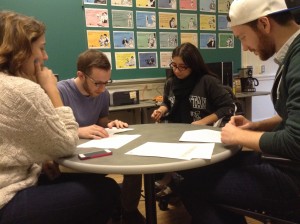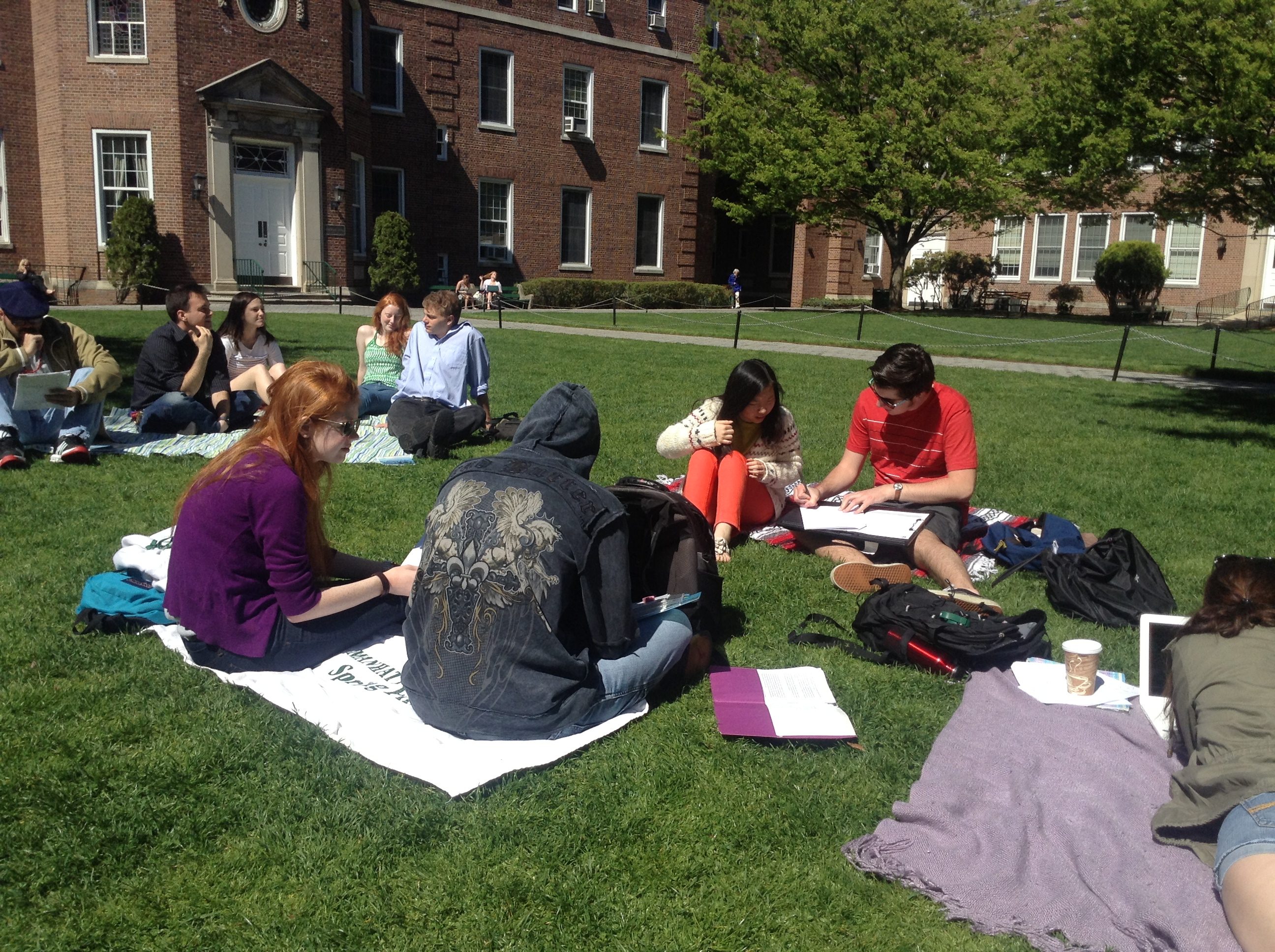 By Adam Koehler, Manhattan College
By Adam Koehler, Manhattan College
When I started my position at Manhattan College, I was hired to play three roles: Assistant Professor of English, Director of Composition, and Director of the Writing Center. I was fresh out of my PhD at UW – Madison and when I got to Manhattan I was excited. Of course I knew that I was walking into a heavy administrative role (and as a junior faculty member), but – how do I say this? – I like building things. I don’t know how else to put it. And I loved that this position asked me to bring some programmatic vision. So I got to work straight away. One of the first things I did, with the help of the English department, was to externalize our Writing Center from the Academic Support Services office, where tutoring in writing was offered alongside tutoring in math, history, etc.: a one stop shop for students looking for extra help. Over the course of two years I established an independent budget, hired twice as many tutors, gained a new space on campus (far more visible and accessible to foot traffic), set up workshops, and pretty much copied everything I learned from Brad at UW – Madison. When we opened our new full-time and independent Writing Center we helped over 300 students in one semester. That was almost a three hundred percent increase.
But a part of me knew that this wasn’t sustainable. We had successfully established a full-service Writing Center. I was training the tutors, hosting staff meetings, teaching workshops with faculty from disciplines across the college, trying to stay on top of reading session summaries, conducting professional development, and putting out the occasional Writing Center fire. And I also had my Director of Composition responsibilities. Not to mention my teaching. And – oh yeah – research. I knew that there needed to be a next phase. And that next phase needed to include more resources.

Around this time we had an administrative sea-change at our College: a new President, a new Provost, and a new Dean. Each of them saw the new Writing Center and each of them liked what he saw. Not long after we set up our new Writing Center, the Provost indicated that he thought it would be a good fit in an office he was putting together called the Center for Academic Success. This office, not a duplication of the Academic Support Services office, he explained, would be a kind of Learning Commons on campus where students can get not only tutoring in a variety of areas, but also supplemental instruction from upperclassmen who serve as devoted tutors in particular classes. I said that was something to think about. I called Brad. I talked to my Dean and to the previous Director of the Writing Center (who was at that point a full time faculty member in the English department).
And I emailed the Writing Center Mailing List.
Brad was great. And I’m not saying that because he hosts this blog. I’m saying it because, well, the Writing Center Mailing List responses were terrifying. I vividly remember coming to my office one morning, checking my inbox, and seeing that there were over twenty responses to my question about moving the Writing Center into the Center for Academic Success. One of those responses was several paragraphs long and told a tragic tale that many of you have probably heard already: a faculty member who was also hired to serve as the Director of the Writing Center went through the same thing I was about to go through. There was a power grab for the Writing Center. It was folded into a Learning Commons. All independence that the Writing Center once had melted away. And it resulted in her having to leave her institution.
I liked my institution. I put hard work into my institution. Specifically, I put hard work into the Writing Center at my institution. I called Brad again. He walked me through the reality of the options presented by the Provost’s desire to move the Writing Center into the Center for Academic Success. He helped me see that this was an opportunity to protect the Writing Center by requesting a full time Director. So I made sure that the practices we had established stayed intact and that the moving of the Writing Center into the Center for Academic Success meant that we would hire an expert to direct the Writing Center full time.
Which is exactly what happened.
While our Writing Center was folded into a Center for Academic Success (which is a lot like a Learning Commons), this turned out for us to be a way of sustaining the Writing Center’s independence. Our new Writing Center Director, who reports to the Director of the Center for Academic Success, has been able not only to preserve the services we provided before her arrival, but has been actively expanding them: new workshops for students, satellite Writing Center locations, and (my personal favorite) “Writing Center on the Quad Day,” during which all Writing Center services are provided on Manhattan College’s beautiful quad on a crisp autumn day in New York. Writing is literally put at the heart of the campus.
I wish I had thought of that one.
At many institutions this may not be the way to go. But what this has provided Manhattan College is undeniable: appropriate resources for a Writing Center that serves writing across the curriculum from an office uniquely suited to do so. Our new Director attends conferences and hosts outreaches on writing across the campus. As a result, working as a Writing Center Consultant has become the most popular job on campus. While some people (faculty included) may not know what the Writing Center does exactly, there is no stigma attached to going. Our numbers demonstrate growth – not just active use, but growth. More people use the Writing Center each semester than the semester before.
I didn’t unsubscribe to the Writing Center Mailing List after I handed the Writing Center off to our new full time Director. I liked checking in on it once in a while. A few days ago I saw a question about hiring non-native English speaking tutors. As I read this person’s request (is this a good idea?) I found myself saying, yes, of course, why wouldn’t you want non-native English tutors – especially if you serve non-native English speaking students. And I found myself nodding at the first response to this person, a Writing Center Director who was an “ESL” student herself, then a Writing Center tutor, and now a Writing Center Director who has specialized in what it means to serve students from diverse linguistic backgrounds. And then I saw that it was written by Manhattan College’s Writing Center Director. And I emailed her right away to say: great response.


This is such a great read, Adam, not only because it catches me up on the work you’ve been doing since I last saw you (has it really been 5 years!?) but because it helps me, as a tutor, recognize the tectonic forces that underlie the daily activities of a writing center.
Until really quite recently I’ve had this sense that colleges and universities, with their institutional inertia, simply cannot change. This predictability is reinforced: it’s not like I have ever woken up some morning to discover that the Department of English had been folded into the School of Veterinary Medicine. So your open discussion of the forces that can change the writing center’s place in the university, and the possible consequences of these changes, are eye-opening. Thank you!
Thanks, Mike. There are certainly a lot of factors that go into making sure that changes work out in the best interests of students and faculty. So much of my story couldn’t have happened without the support of dedicated professors – as well as staff – who made these choices as the College moved forward. I think that while the forces at work – tectonic forces, I like that – can sometimes feel like they are at odds with each other, it’s important for us to provide another narrative: one that helps us see our way through our institutional needs, histories, and resources so that we can design sustainable programs.
Adam, thanks for sharing this story! It’s so important to have multiple models for success for Writing Centers, I think. Good writing fits well to particular situations, and the ways we teach it should do likewise. This sounds like it was the right move for Manhattan College, and I’m glad you found the resources you needed to steer the College in the right direction!
Adam, I found myself nodding in agreement, as well as grimacing in sympathy as I read. Across the isthmus here, the Madison College Writing Center has just this fall moved from an independent space to an (admittedly gorgeous) Student Achievement Center. Ours certainly isn’t one of the horror stories you refer to, but “enfolding,” (I love the image this term calls up, by the way) can be smothering as well as nurturing. The one being folded in certainly has to protect breathing room throughout the process. Mostly I admire your willingness to let go of the baby you’d midwifed so that someone new could keep it growing.
One part of your story that stands out to me, Adam, is the choices you must have faced when fresh on campus and ready to “build things.” What I’ve noticed in my own story is that we are often faced with the dilemma of sustainability. If we build a program or start something great, how will the institution respond? Will they back our efforts. I am so pleased to see that, in the case of your center, they did! But I think that relates not to luck but to the /way/ you went about your work.
It takes a certain amount of bravery (?) or faith (?) to make something that you’re not sure will be supported, after all of your work. I also applaud your bravery in handing off your much beloved Center and for building ties to the new director and for supporting and celebrating her work! But my favorite part of your story is that you are a living, breathing model of writing center work in the collaborations you describe that created a center that would be sustainable.
Thanks for sharing these experiences!
Yes, a great post Adam that shows the challenges of developing a Writing Center’s identity, one that addresses needs specific to a particular institution. I guess now you could say that developing a Writing Center is also a situated practice! We here at Oregon Tech are undergoing a rather similar challenge with respect to developing a Writing Center that accounts for multiple stakeholders. I appreciated your tale of success, too, in particular for its sound, good example of what to do, and most of all for the attention to local campus customs (the quad day sounds grand). As we move forward, I’ll definitely recommend your post. We’ll be able to move forward now more thoughtfully.
Thanks very much for this post, Adam. I’m starting a presentation (which is fueled by my own curiosity and worry/concern) that discusses the impact on a Writing Center’s identity when it becomes part of a Learning Commons–it’s been a challenge to find research or viewpoints that talk about this shift from a Writing Center’s perspective, so your story was very helpful. I thought of posting on WCenter, too, but I think, as you said, the responses would be overwhelming! As our Writing Center is about to begin this “enfolding” process within the next few years, I’m hoping to uncover the positives and negatives so that we can go into it prepared to maintain our identity and space while supporting the creation of a Learning Commons. Your comments were very helpful.